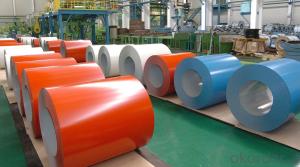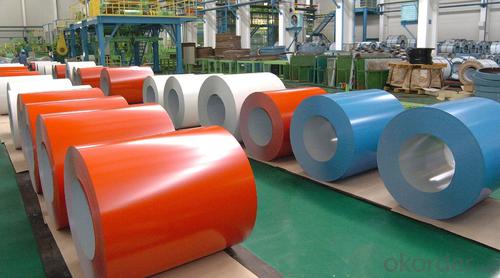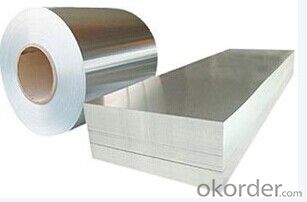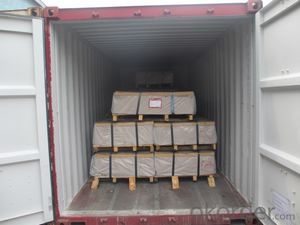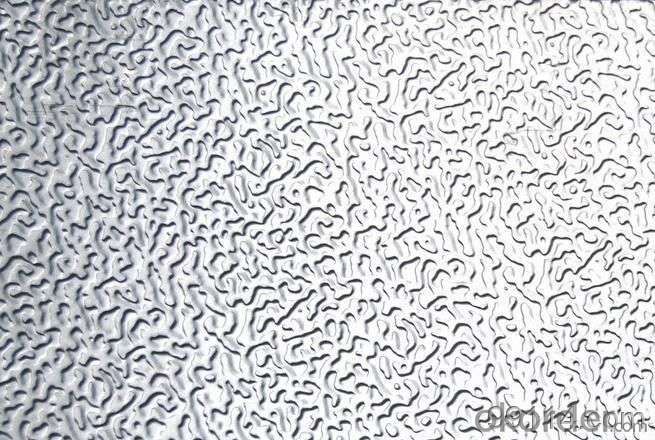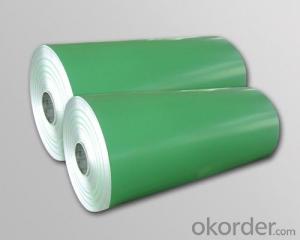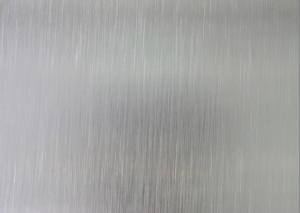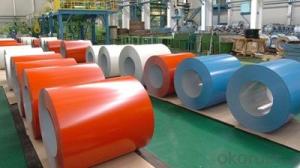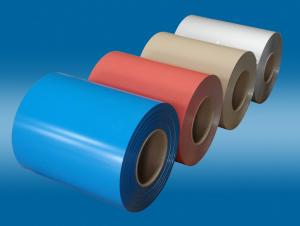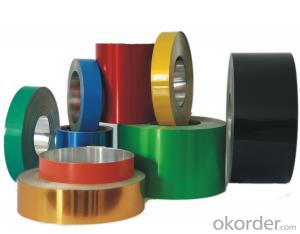Aluminum Coil - AA1100 H16 0.8mm PE Coating
- Loading Port:
- Shanghai
- Payment Terms:
- TT OR LC
- Min Order Qty:
- 20 m.t.
- Supply Capability:
- 8000000 m.t./month
OKorder Service Pledge
Quality Product, Order Online Tracking, Timely Delivery
OKorder Financial Service
Credit Rating, Credit Services, Credit Purchasing
You Might Also Like
supply Mill-finished / coated aluminum sheet/ coil:
Alloy: AA1050,1060,1100,1200,2024,3003,3304,3005,3015,5052,5086,5754,5083,6061,7050,7475,8011, etc
Temper: O, H14/16/18/22/24/32/ H112/H321/T6,T851,T7451,T7351, etc
Thickness: 0.02mm—20mm
Width: 100mm—2000mm (Can be slitted)
Notice: PE coating / PVDF coating / Embossment can be done if required.
- Q: Can aluminum coils be welded?
- Yes, aluminum coils can be welded. Aluminum is a highly weldable material and is commonly used in various industries for its lightweight and corrosion-resistant properties. There are several welding methods that can be used to join aluminum coils, including TIG (tungsten inert gas) welding, MIG (metal inert gas) welding, and laser welding. However, it is important to note that welding aluminum can be more challenging compared to other metals due to its high thermal conductivity and low melting point. Therefore, proper welding techniques and equipment, such as using specialized aluminum welding wire and shielding gases, are necessary to ensure successful and high-quality welds.
- Q: How are aluminum coils formed into different shapes and profiles?
- Aluminum coils are formed into different shapes and profiles through a process known as metal forming. This involves applying force to the coil to change its shape and contour. There are several methods used for shaping aluminum coils, including rolling, bending, extrusion, and stamping. Rolling is the most common method used to shape aluminum coils. It involves passing the coil through a series of rollers that apply pressure to the metal, gradually changing its shape. This process can be done hot or cold, depending on the desired outcome. Hot rolling is typically used for thicker coils, while cold rolling is suitable for thinner ones. Bending is another method used to shape aluminum coils, especially when creating curved or angled profiles. This can be done manually or using specialized bending machines. By applying force, the coil is bent to the desired shape, creating curves or angles as needed. Bending is commonly used in applications such as HVAC systems, automotive components, and construction. Extrusion is a process where the aluminum coil is pushed through a die to create a specific cross-sectional shape. The coil is heated and forced through the die, which determines the final shape of the extrusion. This method is often used for creating complex profiles with consistent dimensions, such as window frames, door frames, and structural components. Stamping is a technique used to create precise shapes and patterns on the surface of aluminum coils. It involves pressing the coil against a die with the desired design, causing the metal to deform and take on the shape of the die. Stamping is commonly used for decorative purposes, such as creating patterns, logos, or text on aluminum sheets. Overall, aluminum coils can be formed into different shapes and profiles through a variety of metal forming methods such as rolling, bending, extrusion, and stamping. These processes allow for the customization and versatility of aluminum in various industries and applications.
- Q: How to calculate the weight of strips with the weight of aluminum coil known?
- Thickness*width*length=weight/density, length=weight/(density*thickness*width).Ps: Keep unit the same.
- Q: I have a aluminum sign that I store in the garage and it got a couple specks of rust on it which I don't like because I use it for my DJ shows. How can I get rid of the rust before it gets too bad without painting over it?
- Aluminum dont rust!! If theres rust on it then its not alum, or it was laying against something steel that was rusty and the rust got onto the alum.. If it's the ladder it should wipe off pretty easy with a clean rag and alittle elbow grease.. Or you can use window cleaner, wd-40, or even tooth paste on a rag to wipe it off.
- Q: Are aluminum coils suitable for marine applications?
- Yes, aluminum coils are suitable for marine applications. Aluminum is a corrosion-resistant material, making it an excellent choice for use in marine environments where exposure to saltwater and other corrosive elements is common. Aluminum coils are lightweight, durable, and have high strength-to-weight ratio, which is important for marine applications where weight reduction is desired. Additionally, aluminum coils can withstand extreme temperatures and have good thermal conductivity, making them suitable for various marine heating and cooling systems. Overall, aluminum coils are a popular choice in marine applications due to their corrosion resistance, durability, and lightweight properties.
- Q: Can aluminum coils be used for electrical applications?
- Yes, aluminum coils can be used for electrical applications. Aluminum is a widely used material in the electrical industry due to its excellent conductivity, lightweight properties, and corrosion resistance. Aluminum coils are commonly used in various electrical applications such as transformers, motors, generators, and coils for inductors and solenoids. They offer advantages such as high thermal conductivity and low eddy current losses, making them efficient in transferring and distributing electrical power. Additionally, aluminum coils are cost-effective compared to copper coils, making them a preferred choice for many electrical applications. However, it is important to note that aluminum has a lower electrical conductivity compared to copper, so the coil design and dimensions may need to be adjusted accordingly to ensure optimal performance.
- Q: This question asks for the current market price of aluminum coils.
- <p>The price of aluminum coils can vary significantly based on factors such as grade, thickness, width, and market conditions. As of my last update, prices fluctuate daily due to global supply and demand, economic indicators, and geopolitical events. For the most accurate and up-to-date pricing, it's best to consult with metal suppliers or check commodity exchanges like the London Metal Exchange (LME). Prices are typically quoted in dollars per metric ton and can range from a few thousand to several thousand dollars depending on the aforementioned factors.</p>
- Q: Are aluminum coils suitable for interior design applications?
- Aluminum coils are indeed a fitting choice for interior design purposes. The versatility of aluminum as a material presents a multitude of advantages for interior design endeavors. To begin with, aluminum possesses a lightweight nature, ensuring ease of handling and installation. This quality proves particularly advantageous for projects necessitating extensive installations or suspended ceilings. Moreover, aluminum coils exhibit exceptional durability and corrosion resistance, guaranteeing extended lifespan and suitability for high-traffic regions. Furthermore, aluminum can be effortlessly tailored and molded to meet specific design requirements, thereby offering limitless design possibilities. Additionally, the material is available in a plethora of finishes, including brushed, polished, or anodized options, which can significantly enhance the aesthetic allure of any interior space. Furthermore, aluminum emerges as a sustainable and eco-friendly alternative, given its easy recyclability and low carbon footprint relative to other materials. All in all, aluminum coils represent a pragmatic and visually pleasing choice for interior design applications.
- Q: What are the common problems faced with aluminum coils?
- Some common problems faced with aluminum coils include corrosion, poor heat transfer, refrigerant leaks, and coil damage due to mechanical stress or improper maintenance.
- Q: Can aluminum coils be used for automotive body panels?
- Yes, aluminum coils can indeed be used for automotive body panels. In fact, aluminum is becoming increasingly popular in the automotive industry due to its many advantages. Aluminum is lightweight, which can contribute to improved fuel efficiency and overall performance of the vehicle. Additionally, aluminum has excellent corrosion resistance properties, making it a durable choice for automotive body panels. Moreover, aluminum can be easily formed and molded, allowing for intricate designs and better aerodynamics. Overall, the use of aluminum coils for automotive body panels is a viable option that offers numerous benefits.
Send your message to us
Aluminum Coil - AA1100 H16 0.8mm PE Coating
- Loading Port:
- Shanghai
- Payment Terms:
- TT OR LC
- Min Order Qty:
- 20 m.t.
- Supply Capability:
- 8000000 m.t./month
OKorder Service Pledge
Quality Product, Order Online Tracking, Timely Delivery
OKorder Financial Service
Credit Rating, Credit Services, Credit Purchasing
Similar products
Hot products
Hot Searches
Related keywords
